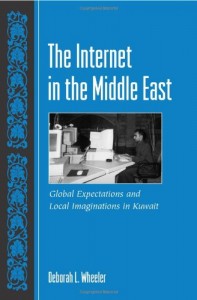
Deborah Wheeler
5.0 out of 5 stars Surprising and therefore valuable, February 11, 2015
This is a solid piece of work that might normally have been a 4 but it surprised me just enough to warrant taking it to a 4. I love unconventional wisdom and seeing solid proof that conventional wisdom — in this case, “The Internet changes everything for the better” questioned.
I read this book on the same flight as I read Richard Wolff's Occupy the Economy: Challenging Capitalism (City Lights Open Media) and this is the second reason I will place the book at five: while the Internet does NOT change everything for the better, especially in the case of women and youth in Kuwait, it IS “occupied,” is does blur the line between the user and the producer, and it does offer a model for new forms of social and economic organization. In a strange way I could not have anticipated, these two books complement each other.
The bottom line in this excellent book is that the Internet ALONE is NOT transformative, and that ideo-cultural and socio-economic contexts can severely inhibit its impact and misdirect its utilization. Kuwait, a form of monarchic socialism in which there are both a lack of trust (great fear of speaking honestly in true name in any forum online or offline) and a government ability to censor, surveil, and punish, is a textbook case in Internet emergence under severe handicap.
I have to remind myself that this book was written before the Arab Spring and before twitter, facebook, and Internet access and anonymnity break-throught were elevated by Egyptian activists to a new level of art. For those interested in the Middle East in particulate, as well as the intersection between social consciousness and the Internet in the face of repressive regimes, I recommend a spectacular recent book by Elza Malouf, Emerge!: The Rise of Functional Democracy and the Future of the Middle East.
The book is an ethnographic study, which is to say, based on interviews with real people in real placed, not to be confused with the quantitative data junk that characterizes most of US political “science.” While the number of cited intereviews are limited, I am more than satisfied by the professionalism of the endeavor and the insights presented by the author.
Among the most valuable elements of the book for me was the author's observation, in passing but ably documented, that as of 2006 there was a clear perception among Arabs that the US was creating a new Cold War mentality with Islam as the enemy. The balance of the book is a superb study of the conflict between liberal (I would have said secularly-oriented) Muslims and “Islamists” seeking to impose Shariah (fundamentalist) blinders on everything.
I have a note to myself that there are TWO major battles raging in the world today, one between the working poor (100 million in the USA, one third of the total population) and the 1% in charge of predatory capitalism; and that between and among the Muslims — the author does not focus on the Sunni – Shia split, on funding of ISIS or Al Qaeda by Saudi Arabia, Qatar, and the UAE, or on the radical differences among Malaysia and Indonesia and Brunei (sane and sensible), Pakistan and Saudi Arabia (fixing to implode), and Turkey (conflicted and losing its secular foundation) but I would give this book high marks for offering multiple useful snap-shots against that larger canvas.
Not addressed in this book, but hanging heavily above it as a storm cloud, is the utter idiocy and abdication of the US as a force for peace and enlightenment. The author observes that only 1 in 4 youth go to prayers in Kuwait, while at the same time five times more women are veiled than in the 1960's. The USA has been — there is only one word for it — STUPID about where to put its emphasis since WWII — in my view we lost our minds after WWII and went on an American exceptionalism rampage that made us the poster child for unilateral militarism, predatory capitalism, and virtual colonialism, spending trillions on overseas based and elective wars and regime change, when a fraction of that money could have furthered the secularization of Islamic governments, provided exit strategies for the despots of Arabia (most our official best pals subsidized at US taxpayer expense) and armed the public with the power that knowledge — and an unencumbered Internet — gives.
On this latter point, see among many other books:
Breaking the Real Axis of Evil: How to Oust the World's Last Dictators by 2025
The Sorrows of Empire: Militarism, Secrecy, and the End of the Republic (The American Empire Project)
Killing Hope: U.S. Military and C.I.A. Interventions Since World War II–Updated Through 2003
Griftopia: A Story of Bankers, Politicians, and the Most Audacious Power Grab in American History
Confessions of an Economic Hit Man
It angers me, thinking about the cost to the US taxpayer of liberating Kuwait from Iraq, to also contemplate how inept and corrupt our government is when it comes to actually spending and planning for public empowerment and democracy — it does not. We have a hypocritical government that supports dictators, not an intelligent ethical government that strives to do well by the larger public.
The bottom line, a quote from page 60: “…Internet use in Kuwait does not necessarily conform to expectations for automatically enhanced democratization, privatization, and individual empowerment.”
Best wishes to all,
Robert David STEELE Vivas
OPEN POWER: Electoral Reform Act of 2015 – Open Source Activist Tool-Kit




